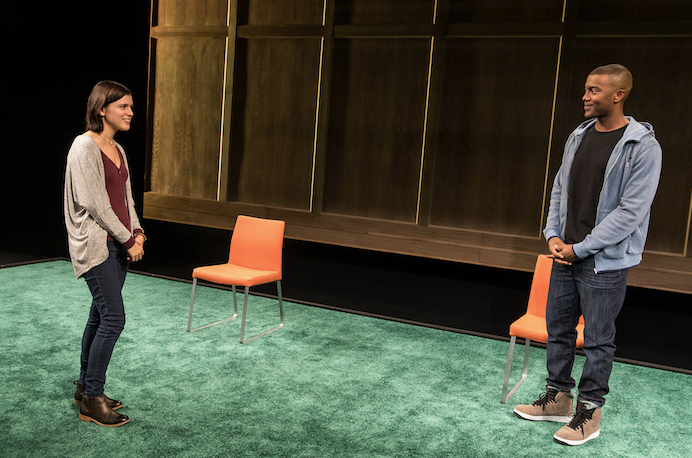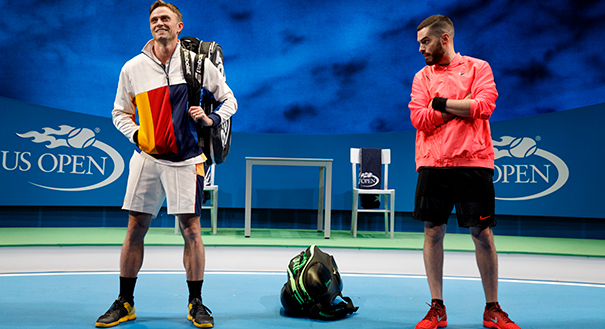

Few living playwrights have the opportunity to have more than one of their works being produced in New York City at the same time; with productions of Actually at Manhattan Theatre Club, and The Last Match at Roundabout, Anna Ziegler joins a club that today, is comprised of her, and musical legends Andrew Lloyd Webber, Lynn Ahrens and Stephen Flaherty. Ziegler’s work has nothing to do with phantoms, singing cats, or princesses, instead it’s often grounded in issues so real that her plays sometimes feel like you’re being allowed into the deepest crevices of her characters’ minds. In Match two rival tennis players who display a polished facade to the world, deal with abandonment and selfishness issues, while in Actually two millennials attempt to connect without always being conscious of the other’s needs and wants.
Perhaps more than any other working playwright, Ziegler understands the complexities of intersectionality and rather than reducing her characters to easily separable archetypes, she uses class, gender, and race to explore topics many shy away from. In Actually the conflicting parties are not just a man and the woman who has accused him of rape, they’re an African American man and a Jewish liberal woman, while in Match the all-American goodness of golden boy Tim is contrasted against the tough upbringing of Eastern European orphan Sergei. In spite of the potential for provocation that lies in her plays, she stays away from sensationalizing events, instead she understands that we all carry emotional and cultural baggage that doesn’t always define us, but that we can’t help but travel with wherever we go.
I spoke to Ziegler about her interest in complex male characters, exploring the world of television and audio drama, and how criticism differs in America and England.
Congratulations on having two plays running in New York at the same time. What’s the most exciting part about that?
It’s a little bit trippy. A few times now, I’ll have friends who I haven’t heard from in a while say “I saw both of your plays in one day in New York,” it allows for these situations that I would never have predicted.
Both plays had already been produced outside NY. As a playwright, is having your show produced in NY still the ultimate goal?
I don’t know, it’s hard to question it because it seems like it just is. I have only had great experiences working out of town, and when you’re in those experiences it never feels like the stakes are lower because you’re not in NY. Every time I work on a production it feels like the be-all/end-all.
When you write you probably aren’t thinking about costumes, lighting and technical aspects. But I’ve noticed how most, if not all, your plays can be done with very minimal elements which makes me think they can be produced all over the world? Is this sense of democracy behind any of your work?
I hope that is the effect, that people feel very free to do them in different ways. It’s obviously thrilling for a playwright to see these wildly different interpretations of your work in terms of staging and design concepts. When I’m writing I don’t think about it, because I’m mostly hearing the plays instead of seeing them. I try to tell stories and the result of that is that there’s a lot in the words, and the set can be almost anything, as spare or as elaborate as someone would want it to be. I’ve always admired plays that don’t require very much, plays that don’t need too many bells and whistles.
You hearing your plays is so fascinating, are you interested in writing a radio drama for a podcast?
I just had lunch with a friend who told me about the new Audible project where they’re doing short radio dramas, and yeah, that sounds like my sensibility.
Which of your plays would you like to try out first?
In some ways Actually lends itself best to that. It’s two people telling their stories and I feel it would translate very easily to that form. Some of my plays have been recorded and I’ve listened to them, but also just to be clear when I write, I imagine visuals, I’m just not always sure what they are.
Sounds like waking up from a dream and remembering quotes but not knowing what you saw.
Exactly.
I overheard people talking about Actually and they mentioned being frustrated over not knowing which character to root for. I loved this because life isn’t about easy answers, even though many critics tend to expect them. When you write these characters who have these questions do you understand the world in a better way?
Yes, I think every play I write represents something I am working through myself, or trying to figure out. I’m posing questions to the audience that I’m wrestling with myself, and I hope there aren’t easy answers. I like plays that leave things open and allow for those conversations in the lobby afterwards, even if it’s frustrating. From my point of view if people want to talk about a play, then it’s doing something right. I don’t think of myself as being a provocateur, but I am proud that Actually lends itself to that. It’s also a little scary to put that out in the world. For the last decade or so in the US, I’ve seen criticism has tended to expect answers for the questions raised in the plays, but in England the response hasn’t been that way. I had this play called Dov and Ali which was done in England in 2008, and in America a year later, it was striking how in England it was praised for raising questions, and in the US people thought that was annoying.
Both Actually and The Last Match deal with elements we see in the news every day, from sexual harassment and rape, to toxic masculinity. You didn’t write the plays yesterday, so were you surprised to realize how of the moment they were when they were being produced?
I wrote Actually two years ago and this topic was already in the air, there was talk about sexual assault in college campuses and whether they were being handled well, with that being said it’s still shocking that we find ourselves in this moment when it’s probably the topic in the news that people are talking about the most. I don’t know if that’s good or bad for the play. It’s resonating in a different way as a result. I’m glad you feel The Last Match feels relevant, to me that play felt more timeless, but maybe that’s a bad reflection on my sense of men and women being the way they are, and a sort of hopelessness on these dynamics ever changing.

In American drama we often see men being saints or brooding jerks, your male characters are different, they offer new layers of manhood we don’t see very often onstage. Why do you find men so fascinating?
(Laughs) I guess I find people fascinating? I hope it’s not limited to men, but it goes back to the grey areas we all exist in. People are really complicated so I try not to reduce my characters to one thing. That has obsessed me through the years, I try to make my characters as complicated and confusing as people are. I’ve had varying degrees of success with that, but it’s always been my intention.
Can you think of instances where you wrote something that read like a stereotype and then quickly remove it?
I’m sure I did, maybe in writing Tim Porter in The Last Match I was pulling myself back from making him too ideal. I wanted him to be this iconic sports star who everyone assumed had a perfect life, so my challenge was to make him seem like this guy who has it all, but not make this boring. So I consciously tried to pull away from that before revealing the difficulties in his life, and made him more of an arrogant jerk, so it didn’t seem I was idealizing him.
You recently started writing for television. When you write a play it’s usually over and done with, but on TV you get to revisit the characters more than once, what’s that like for you?
We will have to revisit this in a year, I’m in the very early stages of my project. I haven’t even finished writing a pilot, so I haven’t been able to revisit characters. All of it feels like an entirely different muscle that I will have to work to build. There’s such a different rhythm in TV shows, you have to think visually which I don’t typically do. It’s a whole other ball game.
Are there any TV episodes or pilots that you admire?
Breaking Bad is one of the best pilots out there, not that any of my shows will ever resemble that, but in terms of form it’s so good. I’ve watched the Friday Night Lights pilot a couple of times cause it’s so great at setting up that world. The projects I’m working on don’t really have obvious models, so I’ll do some foraging out on my own to work them out.
For more information on Actually click here. For more on The Last Match click here.